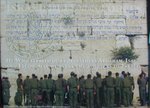We want to call your attention to the fact that some students entering the United States and attempting to get U.S. visas to do so, have been tied to al Qaeda and Iraq. They are mimicking the 9/11 hijackers and pose a great threat to our safety.
This recent revelation calls into question the wisdom of the widely touted project that is bringing 15,000 Saudi Arabian students to this country. Their $30,000 tuition is paid for by the Saudis and some American universities including KU and K-State are vying to take advantage of this tuition windfall. The troubling fact is this: There is no screening and/or supervision of these students and tracking them once they get here can be extremely difficult and complicated.
Out of the 15,000 students, even a few could create great havoc. How do we identify those few to avert another national disaster?
Please read Article #1, to which we refer:
- Details Emerge About Possible Terror Threat, ABC News, Pierre Thomas
- Netanyahu: West must stop Iran from executing new Holocaust, Reuters,
- Bush and Maliki: With Friends Like These…, Newsweek, Michael Hirsh And Richard Wolffe
- Our World: The rule of lawyers, Jerusalem Post, Caroline Glick
- The Question of Carter’s Cash, National Review, Claudia Rosett
- Ashkenazi Named Israel’s Chief of General Staff, The Media Line,
Pierre Thomas
ABC News, January 22, 2007
Mimicking the hijackers who executed the Sept. 11 attacks, insurgents reportedly tied to al Qaeda in Iraq considered using student visas to slip terrorists into the United States to orchestrate a new attack on American soil.
Lt. Gen. Michael D. Maples, head of the Defense Intelligence Agency, recently testified that documents captured by coalition forces during a raid of a safe house believed to house Iraqi members of al Qaeda six months ago "revealed [AQI] was planning terrorist operations in the U.S."
At the time, Maples offered little additional insight into the possible terror plot. ABC News, however, has learned new details of what remains a classified incident that has been dealt with at the highest levels of government.
Sources tell ABC News that the plot may have involved moving between 10 and 20 suspects believed to be affiliated with al Qaeda in Iraq into the United States with student visas -- the same method used by the 19 al Qaeda terrorists who struck American targets on Sept. 11.
Click here for the complete article, or copy and paste this link into your web browser:
http://www.israelunitycoalition.org/news/article.php?id=773
Reuters, January 21, 2007
Opposition leader Benjamin Netanyahu on Sunday passionately called on the world to stop Iran's nuclear ambitions in its tracks by imposing sanctions on the Tehran regime.
"I want to call on the world that didn't stop the Holocaust last time to stop any attempt this time and what needs to be done is divest genocide," he said in an address to the Herzliya conference, a yearly get-together of Israel's political and security elite.
Iran says its nuclear program is aimed only at producing energy, but it is widely believed by the West to be developing nuclear weapons.
The Likud Party Chairman said "voluntary sanctions" could be initiated even before the UN imposes official measures against Iran.
Click here for the complete article, or copy and paste this link into your web browser:
http://www.israelunitycoalition.org/news/article.php?id=772
Michael Hirsh And Richard Wolffe
Newsweek, January 29, 2007
It may have been the last time George W. Bush felt really good about Iraq. Last June, as the president flew back from a surprise visit to Baghdad—and his first sitdown with the new Iraqi prime minister, Nuri al-Maliki—he was visibly excited. Bush was savoring a rare moment in his presidency: an unbroken string of great news out of Iraq. The U.S. Air Force had just knocked off Abu Mussab al-Zarqawi at his hideout north of Baghdad. The tough, plain-spoken Maliki had replaced Ibrahim Jaafari, Iraq's disastrously wishy-washy interim prime minister. And Bush had brazenly ordered Air Force One into a war zone in broad daylight so that he could shake hands with Iraq's first democratically elected leader under the new Constitution. The president wasn't disappointed. "I wanted to hear whether or not he was stuck in the past or willing to think about the future," a relaxed Bush later told reporters onboard Air Force One. "And I came away with a very positive impression." Maliki, Bush said back then, "is a no-nonsense guy that talks about priorities and how he's going to achieve the priorities. And that's comforting."
The White House doesn't seem to be taking much comfort in Maliki now. Late last week Bush gathered a group of his dwindling Republican supporters in the third-floor solarium at the White House to discuss his latest plan to salvage the war in Iraq—the deployment of 21,000 more U.S. troops to pacify Baghdad and Anbar province. According to one participant, conservative Sen. Craig Thomas of Wyoming, many of the GOP senators expressed doubts that America could depend on Maliki. They cited the Shiite leader's failure to quell the sectarian violence that contributed to the deaths of more than 34,000 Iraqis in 2006, according to the United Nations, as well as nearly 600 U.S. soldiers since he took over in May. "The president expressed doubts, too," says Thomas. With Vice President Dick Cheney sitting silently beside him, Bush "also indicated he was going to make pretty clear what he expects from the prime minister." Echoing Secretary of State Condoleezza Rice, who recently told Congress that Maliki was living on "borrowed time," Bush added ominously that "if [Maliki's effort] doesn't work very well there's a good chance those people over there will replace him," says Thomas.
Rarely have so many American hopes depended on a single foreign leader—and one of dubious loyalties at that. The president will walk into the well of the House for his seventh State of the Union speech this week, knowing that his fate is inextricably tied to Maliki's. While Bush will get the customary ovation, he knows the war has emboldened Democrats and silenced Republicans in Congress. In the new NEWSWEEK Poll, the president's approval rating matched his record low of 31 percent. Seventy percent of Americans disapprove of his handling of Iraq, and more than half trust the Democrats in Congress to make better decisions about the war. Two thirds oppose his plan to inject more troops into the fight. Among Republicans, however, there is still broad support for both the war and the president, which creates a dilemma for nervous GOP candidates looking to the next election.
Not surprisingly, the president has retooled his State of the Union address to focus on Iraq. And the key audience will not be Democrats, who are planning to vote on a nonbinding Senate resolution opposing Bush's "surge" plan next week. Instead it will be Republicans, at least a dozen of whom are expected to join Sen. Chuck Hagel voting in favor.
Click here for the complete article, or copy and paste this link into your web browser:
http://www.israelunitycoalition.org/news/article.php?id=774
Caroline Glick
Jerusalem Post, January 22, 2007
Israel prides itself on being the only democracy in the Middle East. But if we are not careful, we will lose that distinction. Today Israel finds itself increasingly under the rule not of law, but of lawyers. And the results are similar to the results in other states where the rule of law is undermined. Lawlessness, loss of personal security and selective legal protection are becoming more and more widespread.
Sunday, former justice minister Prof. Amnon Rubinstein warned against this growing phenomenon in a broadside against Attorney-General Menachem Mazuz. Speaking at the Herzliya Conference, Rubinstein, who now serves as the dean of the Herzliya Interdisciplinary Center, rebuked Mazuz for threatening to limit Prime Minister Ehud Olmert's executive powers if he deems them to be in conflict with the criminal probe of Olmert's role in the privatization of Bank Leumi.
In Rubinstein's words, "The attorney-general is not permitted to limit the powers of a minister or of the prime minister. He is certainly not permitted to threaten to limit them." Rubinstein continued: "This is an extremely serious matter. It is without precedent in any democratic country… There is a danger in a regime of bureaucrats. An elected representative is always dependent on the public, whereas we have no control over appointed officials."
Mazuz and his colleagues routinely respond to attacks similar to Rubinstein's by stating that their expropriation of the legally mandated powers of elected leaders is done merely to protect the rule of law. Yet this is untrue.
Click here for the complete article, or copy and paste this link into your web browser:
http://www.israelunitycoalition.org/news/article.php?id=775
Claudia Rosett
National Review, January 29, 2007
Did Jimmy Carter do it for the money? That’s the question making the rounds about Palestine: Peace Not Apartheid, an anti-Israeli screed recently written by the ex-president whose Carter Center has accepted millions in Arab funding.
Even in Carter’s long history of post-presidential grandstanding, this book sets fresh standards of irresponsibility. Purporting to give a balanced view of the Palestinian–Israeli conflict, Carter effectively shrugs off such highly germane matters as Palestinian terrorism. The hypocrisies are boundless, and include adoring praise of the deeply oppressive, religiously intolerant Saudi regime side by side with condemnations of democratic Israel. In one section, typical of the book’s entire approach, Carter includes a “Historical Chronology,” from Biblical times to 2006, in which he dwells on events surrounding his 1978 Camp David Accords but omits the Holocaust. Kenneth W. Stein, the founder of the Carter Center’s Middle East program, resigned last month to protest the book, describing it in a letter to Fox News as “replete with factual errors, copied materials not cited, superficialities, glaring omissions, and simply invented segments.” As this article goes to press, more protest resignations, this time from the Carter Center’s board of councilors, appear to be in the works.
If there is a silver lining to any of this, it is that Carter’s book has drawn much-overdue attention to some of the funding that pours into the Carter Center, whose intriguing donor list includes anti-Israeli tycoons and Middle East states. Founded in 1982 and appended to Carter’s presidential library, the center has served for almost a quarter century as the main base and fund-raising magnet for Carter’s self-proclaimed mission to save the world.
In recent weeks, a number of articles have noted that Carter’s anti-Israeli views coincide with those of some of the center’s prime financial backers, including the government of Saudi Arabia and the foundation of Saudi prince Alwaleed bin Talal bin Abdul Aziz al-Saud, whose offer of $10 million to New York City just after Sept. 11 was rejected by then-mayor Rudy Giuliani because it came wrapped in the suggestion that America rethink its support of Israel. Other big donors listed in the Carter Center’s annual reports include the Sultanate of Oman and the sultan himself; the government of the United Arab Emirates; and a brother of Osama bin Laden, Bakr BinLadin, “for the Saudi BinLadin Group.” Of lesser heft, but still large, are contributions from assorted development funds of Saudi Arabia and Kuwait, as well as of OPEC, whose membership includes oil-rich Arab states, Nigeria (whose government is also a big donor to the Carter Center), and Venezuela (whose anti-American strongman Hugo Chávez benefited in a 2004 election from the highly controversial monitoring efforts of the Carter Center).
Click here for the complete article, or copy and paste this link into your web browser:
http://www.israelunitycoalition.org/news/article.php?id=776
The Media Line, January 23, 2007
Israel’s Prime Minister Ehud Olmert and Defense Minister Amir Peretz have agreed to appoint Maj.-Gen. (res.) Gabi Ashkenazi as the next chief of General Staff of the Israel Defense Forces. They were forced into selecting a new top general after Lieut.-Gen. Dan Halutz announced his resignation earlier this month. Halutz decided to go because of the failures uncovered in the IDF in the wake of last summer’s fighting against Hizbullah in Lebanon. For the past two years Ashkenazi has served as the director general of Israel’s Defense Ministry. Prior to that, Ashkenazi was the commander in charge of Israeli forces in the north of the country. The country’s Movement for Quality Government is challenging the appointment in the courts, claiming the issue should only have been settled after the publication, in a week or two, of a major investigation into the war in Lebanon.
Click here for the complete article, or copy and paste this link into your web browser:
http://www.israelunitycoalition.org/news/article.php?id=777
Click here to donate
UCI's website and emails are written to current web standards according to the W3C. If your browser or email client is not standards-compliant, you can go here for one that is.

























No comments:
Post a Comment